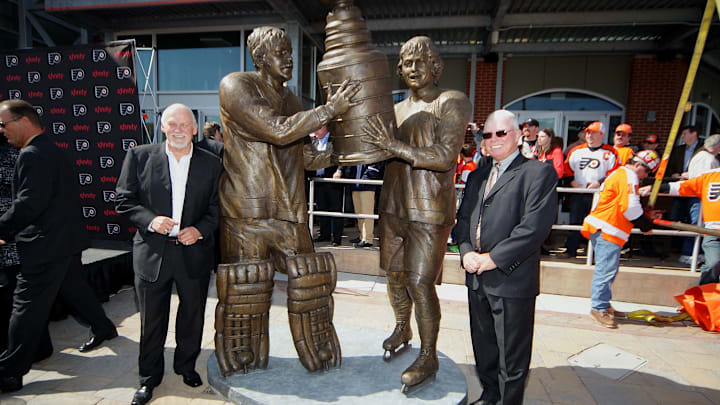"Win today, and we walk together forever."
Anybody who knows anything about the Philadelphia Flyers knows the origins of those words, scrawled on the locker room blackboard by head coach Fred Shero on May 19, 1974 before a pivotal Game 6 of the Stanley Cup Final between the Flyers and the Boston Bruins. A few hours later, following a 1-0 Flyers victory to bring the Cup to Philadelphia, a legend was born and the identity of the franchise and its fanbase was cemented for all-time.
Yes, the Flyers also won the Stanley Cup in 1975, meaning that they have (for now) won a title in the last 50 years, but all signs point to the magnitude of their first championship being the defining moment for a team that was only in its seventh year of existence at the time. The Flyers couldn't compete with the talent of the more established clubs, and they spent several years surrounding the scoring that they could accumulate with the kind of toughness that would make them a labor to play against. The team bought in, the fans bought in, and an identity was forged in a fire during the 1974 playoffs, culminating in an upset victory over a Bruins dynasty in the making that featured Bobby Orr and Phil Esposito.
The Flyers identity was set after the franchise's first Stanley Cup victory 50 years ago
From that day forward, it became league-wide knowledge that the Flyers would be about all-out effort and had the guts to persevere under even the most difficult circumstances. Maybe you could out-skill them, but you'd probably come up short against the Flyers because they wanted it more and would run through a wall for each other. And even if you managed to win the game, you'd lose the physical battle and pay a high price. In our sports-obsessed culture, the Flyers gave their fans everything they could ask for. They played hard and never quit.
It continued this way for many years. Even though the Flyers kept coming up short of the ultimate prize year after year following the 1975 repeat, they were at least in the mix each season and proved to be a 'tough out' come playoff time. They got agonizingly close several times, stopped only by dynasties like the Islanders and Oilers. Following a dark time in the late 1980s and early 1990s, the Eric Lindros trade paved the way for a new era of the franchise, complete with a new home when the team moved out of the Spectrum in 1996. Alas, Lindros' time in town would also end Cup-less, another unfulfilled chapter in team history.
In this century, results have been decidedly mixed for the Orange and Black, skewing more frequently towards bad than good, unfortunately. But if you look, you can see examples of how certain iterations of the team are fondly remembered because they exuded the spirit of what the Flyers are all about.
In 2004, the Flyers went to Game 7 of the Eastern Conference Finals despite being outgunned, outmanned, banged, and bruised to a critical point. When they were finally eliminated by the Tampa Bay Lightning that spring, there was disappointment, of course. But there was pride and a sense that the team had given every last bit of effort, blood, and sweat that it could.
20 years ago today … Darcy Tucker DESTROYS Sami Kapanen but Jeremy Roenick comes down and puts the #Leafs away in Overtime #LetsGoFlyers | #LeafsForever pic.twitter.com/75oH1ruegB
— Missin Curfew (@MissinCurfew) May 4, 2024
The same can be said about the 2010's extremely unlikely run to the Cup Final, one that ended just two wins shy of breaking a 35-year drought. The team was flawed, but it rode a crazy hot streak and a likable group of all-effort players before things ended in typically heartbreaking fashion for the Flyers. And even this year's version did wonders to restore some legitimacy to the franchise after it had seemingly lost its way under the miserable reign of Chuck Fletcher. Yes, they ran out of gas and missed the playoffs, but there was still a sense of pride in their work as the Flyers look to be trying to rebuild something the right way.
John Tortorella: "I'm proud of the team. They fought to the end."#Flyers pic.twitter.com/97CbW9CsIP
— Flyers Nation (@FlyersNation) April 17, 2024
Don't get the wrong idea, it's nice to have skill. Any team serious about competing for a Stanley Cup needs scorers and finishers, along with the right mix of supporting cast that can get the job done at both ends of the ice. And a hot goalie doesn't hurt either. Maybe the Flyers put the pieces together in the next couple of seasons to return the franchise to glory. A fan can only hope.
Until then, let's look at days like today not as an indicator of what the franchise used to be and hasn't been able to get back to. Rather, let's use the 50th anniversary of the team's first Stanley Cup as a guidepost for what the franchise was built on, the standard it strives to uphold. The Broad Street Bullies are frozen in time, but each era of the Philadelphia Flyers can be used as a springboard to add to the richness of the franchise. The current Flyers are on the right track to add to that history and create their legacy, and the fans are hungry to cling to something new, something they haven't felt in far too long. The Flyers' identity, one cemented 50 years ago today, is coming back. It's an exciting time for the franchise.
